 My guest this month is Eliza Graham, author of nine books including The One I Was, The Truth in Our Lies and The Lines We Leave Behind. Eliza’s novels have been long-listed for the UK’s Richard & Judy Summer Book Club in the UK, and short-listed for World Book Day’s ‘Hidden Gem’ competition. She has also been nominated for the Baileys Women’s Prize for Fiction and the Walter Scott Prize for Historical Fiction. Her books have been bestsellers both in Europe and the US.
My guest this month is Eliza Graham, author of nine books including The One I Was, The Truth in Our Lies and The Lines We Leave Behind. Eliza’s novels have been long-listed for the UK’s Richard & Judy Summer Book Club in the UK, and short-listed for World Book Day’s ‘Hidden Gem’ competition. She has also been nominated for the Baileys Women’s Prize for Fiction and the Walter Scott Prize for Historical Fiction. Her books have been bestsellers both in Europe and the US.
Eliza lives in an ancient village in the Oxfordshire countryside with her family. Not far from her house there is a large perforated sarsen stone that can apparently summon King Alfred if you blow into it correctly. Eliza has never managed to summon him. Her interests still mainly revolve around reading, but she also enjoys walking in the downland country around her home and travelling around the world to research her novels.
You can connect with Eliza via her website, Instagram (@elizagraham1) and Facebook.
Eliza’s most recent release, Let Me Go, is available on Amazon. You can find all of Eliza’s books on her Amazon author page.
What or who inspired you to first write? Which authors have influenced you?
There are honestly too many to list! I was the child who got dressed and cleaned her teeth while reading. Then I studied English Literature at university …. Alan Furst, Elizabeth Jane Howard and Sarah Gainham have long been favourites for novels set in the 1940s: my own favourite time period when I’m writing. I also have a weakness for long Victorian novels and reread Dickens, Wilkie Collins and Trollope every few years. There’s a comfort in seeing that some sorrows and challenges are perennial. I think reading books that have been around for a hundred or more years or so is good for encouraging resilience. We’re humans: we have to get through difficult times and hope for better days. We can do it because our ancestors have shown us in books how to do this.
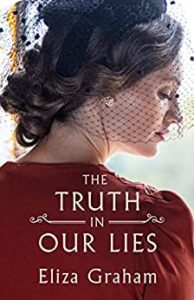 What is the inspiration for your current book? Is there a particular theme you wished to explore?
What is the inspiration for your current book? Is there a particular theme you wished to explore?
I love books about generations in a family (Elizabeth Jane Howard’s Cazalet saga, for instance) and I wanted to explore the grandmother-granddaughter theme. You Let Me Go is about a wartime family secret that emerges to drive a wedge between a young woman and her grandmother. Many people didn’t talk much about their wartime experiences. There wasn’t a culture of ‘getting it out’ and feeling better. People were told to get on with their lives and not dwell on sad or traumatic experiences. I can see that would work for some people, but it can mean that important things are revealed at the very end of their lives or even when they’re dead. Their loved ones may have questions that can never be answered.
What period of history particularly inspires or interests you? Why?
I grew up exploring the semi-decayed air-raid shelters near my grandmother’s home in London—to her horror: she said they were full of rats and drunks. When I started work, I stared out at the tower of St Alban’s in the City of London, all that remained of church a built by Christopher Wren. So the Second World War and its effect on people, especially women, off the frontline has long fascinated me. Many of my ten books are about women struggling to survive in extraordinary wartime circumstances.
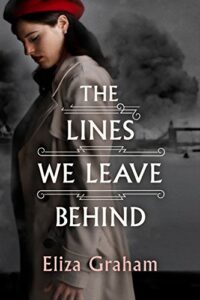 What resources do you use to research your book? How long did it take to finish the novel?
What resources do you use to research your book? How long did it take to finish the novel?
Ideally I visit my settings in person and have done this for every novel I have had published. I’ve been to remote bunkers in Brittany, forests in Poland and memorials to the dead in Slovenia, among other places. My work-in-progress is set in the New York of 1941. I’ve visited the city three times in the past and had hoped to return again, but that wasn’t possible in 2021 for obvious reasons. So I found a brilliant resource—a kind of Google maps for 1940s NYC which gives street views of the buildings. I have to ration myself when I look at it!
As far as historical research goes, I buy lots of books for research and also read scholarly journals. I love visiting archives and museums, though that’s been hard, too, over the last two years. More and more material is available digitally and that’s been such a help. One of 2021’s highlights was a visit to the Liverpool Docks and the wonderful Maritime Museum there. It was a particular delight as one of the lockdowns had just ended.
What do you do if stuck for a word or a phrase?
That’s what second and subsequent drafts are for—filling in the blanks! I never let it bog me down if there’s a word or detail missing, unless it is absolutely key for the story or character progression. My aim is to crack on with a book while it’s flowing.
Is there anything unusual or even quirky that you would like to share about your writing?
I have multiple notebooks: at least one for each project, but still seem to revert to Post-It notes. So bright and easy and you can stick them on the screen so there’s a very immediate reminder that you need to sort something out in chapter 13.
Like many writers, I find running water: be it washing up, the shower, the bath, the sea, stirs my creativity and often find myself dashing to my laptop to capture a thought I’ve had while washing my hair.
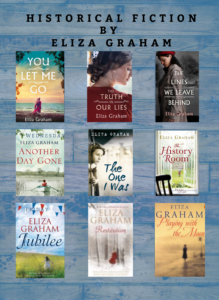
Do you use a program like Scrivener to create your novel? Do you ever write in long hand?
I do have Scrivener and sometimes find it useful but prefer the fluidity of Word. Increasingly I use quite detailed bookmarks in Word, which link me to how revelations unfold and characters develop, etc, and allow me to jump from one bit of a book to another to check whether someone knew something in 1941, for instance, or whether they only found out in 2019.
I always take a writing pad with me travelling and sometimes find myself writing scenes in longhand.
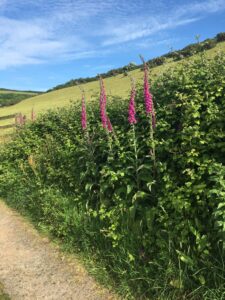 Is there a particular photo or piece of art that strikes a chord with you? Why?
Is there a particular photo or piece of art that strikes a chord with you? Why?
One of the last pre-pandemic research trips I took, back in the summer of 2019, was to the south of Cornwall. On the first evening we went for a walk on the coastal path. The foxgloves were everywhere and something about them, the blue sky and the coastal footpath itself just seemed so hopeful and full of possibility. This is just a simple photo, taken on my mobile, but when I look at it, I am back in Cornwall on a sunny Saturday evening in early summer, full of anticipation and optimism. I love the four sentinel foxgloves looking out to sea.
It was a trip that led to many interesting discoveries and took my last book, You Let Me Go, in a completely different direction. I missed my expeditions so much when we were locked down. Thinking about the good times in the past and trusting they would return helped keep me writing — and sane.
What advice would you give an aspiring author?
Writers write. And writers read–copiously. Don’t be in too much of a rush to get your first book published before other eyes have looked at it and do join a writers’ group or forum or somewhere you can exchange your work and receive critiques. You’ll learn so much from this process. Writers’ groups are also good places to exchange industry gossip, find out who’s open to submissions, which editors and agents are moving on, etc. Above all, they’re the best support system. Writing can be a lonely business. I still swap critiques with a writer I first ‘met’ about 15 years ago in a writers’ forum and we’ve grown close.
Tell us about your next book.
My work-in-progress, tentatively titled The Girl in Lifeboat Six, is about Romilly who flees Blitz-ridden London for New York, anticipating an easier life. Instead her ship is torpedoed and she and the young boy she’s looking after find themselves trying to survive in a lifeboat in the stormy North Atlantic.

After her beloved grandmother Rozenn’s death, Morane is heartbroken to learn that her sister is the sole inheritor of the family home in Cornwall – while she herself has been written out of the will. With both her business and her relationship with her sister on the rocks, Morane becomes consumed by one question: what made Rozenn turn her back on her?
When she finds an old letter linking her grandmother to Brittany under German occupation, Morane escapes on the trail of her family’s past. In the coastal village where Rozenn lived in 1941, she uncovers a web of shameful secrets that haunted Rozenn to the end of her days. Was it to protect those she loved that a desperate Rozenn made a heartbreaking decision and changed the course of all their lives forever?
Thanks Eliza – I hope one day King Alfred might commune with you! Thanks for all your insights into your inspiration and writing process. I’m in awe of your wonderful list of books.
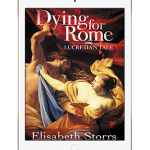 Haven’t subscribed yet to enter into giveaways from my guests? You’re not too late for the chance to win this month’s book if you subscribe to my Inspiration newsletter for giveaways and insights into history – both trivia and the serious stuff! In appreciation for subscribing, I’m offering an 80 page free short story Dying for Rome -Lucretia’s Tale.
Haven’t subscribed yet to enter into giveaways from my guests? You’re not too late for the chance to win this month’s book if you subscribe to my Inspiration newsletter for giveaways and insights into history – both trivia and the serious stuff! In appreciation for subscribing, I’m offering an 80 page free short story Dying for Rome -Lucretia’s Tale.



Such a fascinating time period.
I love reading about that time period. It’s was a simpler time.
Thank you for hosting me and to those leaving comments and apologies for the delay in saying this!